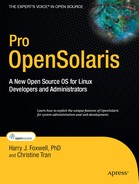APPENDIX A
Recommended Reading and Viewing
In this book we have emphasized the key features of OpenSolaris and have organized the chapters in a way that builds up to the practical examples in Chapter 8. But you can use numerous additional resources to enhance and extend what you've learned here. In this appendix we list some valuable documents, videos, and communities that are part of the growing body of OpenSolaris knowledge.
Books
Although there are as yet very few books devoted exclusively to OpenSolaris, there are some that cover both Solaris and OpenSolaris including these by McDougal, Mauro, and Gregg. For readers interested in the internal architecture and source code of OpenSolaris, the Solaris Internals book is very instructive. For those interested in performance tools, especially in DTrace, the Solaris Performance and Tools book is required reading:
Richard McDougall and Jim Mauro. Solaris Internals: Solaris 10 and OpenSolaris Kernel Architecture, 2nd ed., Upper Saddle River, NJ: Prentice Hall, 2007.
Richard McDougall, Jim Mauro, and Brendan Gregg. Solaris Performance and Tools: DTrace and MDB Techniques for Solaris 10 and OpenSolaris. Upper Saddle River, NJ: Prentice Hall, 2007.
Software developers will find much value in publications for Solaris, since OpenSolaris has many features identical to or derived from those in Solaris 10. Daryl Gove's book can give readers a head start learning about programming in this new environment, especially for the new multicore, multithread processors:
Gove, Darryl. Solaris Application Programming. Upper Saddle River, NJ: Prentice Hall, 2008.
Blogs and Wikis
Sun engineers and OpenSolaris community member regularly blog about new OS features, new tools and techniques, and the future of OpenSolaris. You can participate in their discussions and can often get your technical questions answered by the original designers of the software. Here are a few representative blogs worth reading regularly:
Jeff Bonwick's blog, http://blogs.sun.com/bonwick/. ZFS wisdom from one of its designers.
Darryl Gove's blog, http://blogs.sun.com/d/. Darryl is a Sun compiler engineer specializing in SPARC programming.
Jim Grisanzio's blog, http://blogs.sun.com/jimgris/. Jim is Program Manager for OpenSolaris development. He travels the world promoting OpenSolaris communities.
Brian Leonard's OpenSolaris blog, called the Observatory, http://blogs.sun.com/observatory/. Brian is a senior software engineer for Sun Microsystems; he blogs about software and web stack development on OpenSolaris.
OpenSolaris wiki, http://wikis.sun.com/display/OpenSolaris/OpenSolaris. A collaborative web site of OpenSolaris news, events, documentation, and ideas.
Developer Resources
Sun has extensive online resources focused primarily on Solaris development, but more OpenSolaris material is being included for new open source developers:
OpenSolaris Subscription Service, http://www.sun.com/service/opensolaris/. Paid subscription support for OpenSolaris production users.
Sun Developer Network, http://developers.sun.com/. A free community for Sun developers, including an OpenSolaris group.
Learning and Training
The OpenSolaris community encourages academic and commercial educators to teach OpenSolaris and to use it as a platform for learning about open source operating system and application development. Free training and curriculum resources are available:
OpenSolaris Curriculum Development Resources, http://opensolaris.org/os/community/edu/curriculum_development/. Resources for computer science educators teaching OS concepts using OpenSolaris.
OpenSolaris Learning Cloud Service, https://learning.sun.com/solc/course/sandbox-1. Try out new features of OpenSolaris for free without downloading, installing, or configuring it; just log in and learn.
OpenSolaris Technical Essentials Guide, http://www.sun.com/training/catalog/courses/WS-1000-OS.xml. A free web course on installing, using, administering, and distributing OpenSolaris.
Linux to OpenSolaris Translation
One of the most useful online documents for UNIX and Linux administrators is Bruce Hamilton's Rosetta Stone for UNIX, at http://www.bhami.com/rosetta.html. It lists dozens of commands and their equivalents for Linux and for all of the major UNIX implementations. It includes a feature that lets you generate a table that lists typical OpenSolaris tasks and programs and their Linux counterparts.
Newsletter
The monthly newsletter OpenSolaris Ignite, http://www.sun.com/emrkt/opensolaris/ignite/, is by, for, and about the OpenSolaris community, featuring news, how-to articles, tech tips, and reviews.
User Groups
Participating in user groups is one of the best ways to learn about new technologies, to share ideas, and to grow the community. More than 110 OpenSolaris user groups are currently active; details on how to start a user group are also included here:
Join or start an OpenSolaris user group, http://opensolaris.org/os/usergroups/. You can see a map of user groups in almost every continent on the planet (none yet in Antarctica!).
Videos
Educational videos about OpenSolaris features are a good way to learn from community experts. Here are a few such videos, and you can find more on Sun and YouTube:
A 10-minute video about partitioning your hard drive if you have multiple boot partitions, http://frsun.downloads.edgesuite.net/sun/07C00892/media/demos/OpenSolarisDualBoot-Step2-Partition.html, January 2009. How to install OpenSolaris in a multiboot configuration.
A 10-minute video about using the Package Manager GUI for installing packages, http://webcast-west.sun.com/interactive/09B01790/index.html, January 2009. Learn how to use the OpenSolaris Package Manager.
OpenSolaris & Intel Xeon Processors, http://www.youtube.com/watch?v=VIb8VIg0JM0, April 2008. Intel Open Source Technology Engineer talks about OpenSolaris.
CSI: Munich—How to Save the World with ZFS and 12 USB Sticks, http://video.google.com/videoplay?docid=8100808442979626078, March 2007. An amusing but educational demo of key ZFS features using UFS memory sticks.
Web Sites
Here are some additional web sites for OpenSolaris developers, administrators, and end users:
OpenSolaris Communities, http://opensolaris.org/os/communities/. Developers and users of all the evolving OpenSolaris features.
OpenSolaris Projects, http://opensolaris.org/os/projects/. Collaborative work on new and problem areas of OpenSolaris.
Resource Collection: OpenSolaris, http://www.sun.com/bigadmin/collections/opensolaris.jsp. OpenSolaris tips and tools for administrators.
Solaris Information Center—Community: OpenSolaris, http://www.sun.com/bigadmin/hubs/documentation/community/opensol.jsp. The OpenSolaris community at Sun's BigAdmin site for system administrators.
Solaris Information Center—How To: OpenSolaris Installation and Image Packaging System, http://www.sun.com/bigadmin/hubs/documentation/howto/install-nev-current.jsp, January 2009.
Solaris Internals and Performance FAQ, http://www.solarisinternals.com/wiki/index.php/Solaris_Internals_and_Performance_FAQ.
Towards Running Trusted Extensions with OpenSolaris 2008.11, by Christoph Schuba, http://blogs.sun.com/schuba/entry/running_trusted_extension_with_opensolaris, September 2008.
White Papers
More detail on the security features of zones; references Solaris 10 but fully applicable to zones on OpenSolaris:
"Security Advantages of the Solaris Zones Software," by Christoph Schuba, http://wikis.sun.com/display/BluePrints/Security+Advantages+of+the+Solaris+Zones+Software, December 2008.
"Understanding the Security Capabilities of Solaris Zones Software," by Glenn Brunette and Jeff Victor, http://wikis.sun.com/display/BluePrints/Understanding+the+Security+Capabilities+of+Solaris+Zones+Software, December 2008.
